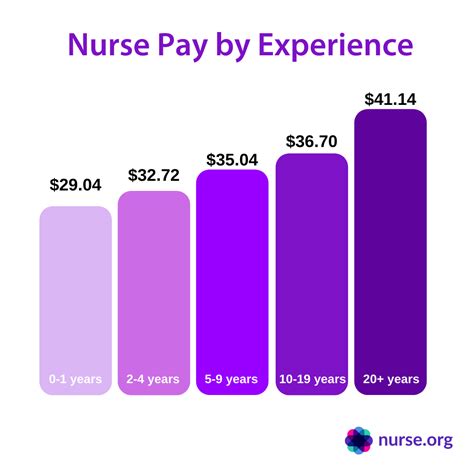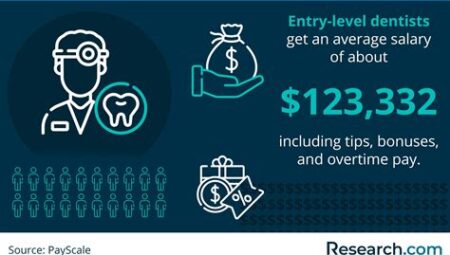Are you considering a career in nursing and wondering about the potential salaries and earning opportunities in 2023? Look no further! This comprehensive guide will provide you with all the information you need to know about nursing salaries in the upcoming year. From the overall overview of nursing salaries to the factors that influence them, the highest-paying nursing specialties, entry-level salaries, and the impact of experience and geographical location, we’ve got you covered. We will also discuss the impact of additional certifications on nursing salaries, effective negotiation strategies, and the benefits and perks that come with nursing salaries. Additionally, we’ll project future trends in nursing salaries, giving you a glimpse of what the future may hold for aspiring nurses. Whether you’re just starting out or looking to advance in your nursing career, this guide will equip you with the knowledge you need to make informed decisions about your future in nursing.
Table of Contents
Overview of nursing salaries in 2023
Nursing salaries are expected to see an increase in 2023 as the demand for healthcare professionals continues to grow. With the ongoing global health crisis and an aging population, the need for qualified nurses is at an all-time high, resulting in higher salaries for those in the field.
In 2023, nursing salaries are projected to be influenced by several factors, including experience level, geographical location, and additional certifications. Nurses with specialized skills and certifications can expect to earn higher salaries, while those in entry-level positions may start at a lower rate but have the potential for growth as they gain experience and further their education.
Geographical location plays a significant role in determining nursing salaries, with urban areas typically offering higher wages to compensate for the higher cost of living, while rural areas may have lower salaries but a lower cost of living. Additionally, the impact of nursing salary negotiation strategies and the benefits and perks that accompany nursing salaries should not be overlooked when considering overall compensation.
It’s important for nursing professionals to stay informed about the latest salary trends and projected future trends in nursing salaries to make informed decisions about their careers. By understanding the various factors that can influence nursing salaries, nurses can better navigate their career paths and seek out opportunities for professional growth and increased compensation.
Factors influencing nursing salaries
When it comes to determining the salaries of nurses, there are various factors that come into play. The level of education and experience of the nurse plays a significant role in determining their salary. Nurses with advanced degrees or specialized certifications often earn higher salaries compared to those with just a basic nursing qualification.
Another important factor influencing nursing salaries is the geographical location of the nurse’s workplace. Nurses working in urban areas or regions with a higher cost of living typically earn higher salaries compared to those working in rural or less affluent areas.
In addition to this, the demand for nurses in a particular area can also impact their salary. Areas with a high demand for nurses, such as areas with an aging population or limited healthcare facilities, often offer higher salaries and better benefits to attract and retain qualified nursing professionals.
Furthermore, the type of healthcare facility also influences nursing salaries. Nurses working in prestigious hospitals or specialized healthcare facilities may earn higher salaries compared to those working in smaller clinics or community healthcare centers.
Highest-paying nursing specialties in 2023
One of the most crucial decisions that nurses can make is choosing a specialty, especially when considering the earning potential. In 2023, nursing specialties that are expected to offer the highest salaries include nurse anesthetists, who work closely with surgeons, anesthesiologists, dentists, and podiatrists to provide anesthesia services to patients. This role comes with a high level of responsibility and requires advanced education and training.
Another high-paying nursing specialty is a nurse practitioner, a role that involves the diagnosis and treatment of various acute and chronic illnesses. Nurse practitioners are also authorized to prescribe medication and provide treatment plans, making them valuable members of the healthcare team.
Additionally, nurse midwives are also projected to be among the top-earning nursing specialties in 2023. These professionals provide care for women during pregnancy, childbirth, and the postpartum period. Their advanced knowledge and skills allow them to take on a significant role in women’s health, leading to a higher earning potential.
Nursing informatics is another high-paying specialty that is expected to continue to grow in demand. These professionals combine their nursing expertise with information science to manage and communicate data, knowledge, and wisdom in nursing practice. Given the increasing reliance on technology in healthcare, nursing informatics specialists are becoming increasingly valuable, resulting in higher earning potential.
Entry-level nursing salaries in 2023
Entry-level nursing salaries are an important consideration for those looking to enter the nursing profession. As of 2023, the average entry-level nursing salary is expected to be influenced by a variety of factors, including location, experience, and additional certifications.
Factors that can impact entry-level nursing salaries include the cost of living in a particular area, the demand for nurses in that location, and the specific healthcare facilities in which a nurse is employed. Additionally, the level of competition for entry-level nursing positions can also impact the starting salary for new nurses.
It’s important for those considering a career in nursing to carefully research the entry-level nursing salaries in their desired location and to consider the potential for growth within the profession. While entry-level salaries may vary, the nursing profession as a whole offers opportunities for advancement and competitive compensation for those who choose to pursue additional certifications or specialize in a particular area of healthcare.
As the healthcare industry continues to evolve, the projected future trends in entry-level nursing salaries will be influenced by changes in the healthcare landscape, advancements in technology, and shifts in patient demographics. It’s essential for new nurses to stay informed about these trends and to seek out opportunities for professional development in order to maximize their earning potential in the nursing profession.
Average nursing salaries based on experience
When considering a career in nursing, one of the factors that can greatly influence your decision is the potential salary that comes with the job. It’s important to understand how nursing salaries can vary based on experience, as this can help you set realistic expectations and plan for your future.
Nursing salaries for entry-level positions typically range from $50,000 to $65,000 per year, depending on location and employer. Nurses with 1-4 years of experience can expect to earn around $60,000 to $75,000 annually. As nurses gain more experience and expertise in their field, their salaries can increase significantly. Nurses with 5-9 years of experience often earn between $70,000 and $90,000 per year, while those with 10+ years of experience can command salaries of $80,000 to $100,000 or more.
These figures are just a general overview and can vary widely based on factors such as geographical location, additional certifications, and specialized skills. It’s worth noting that nurses in certain high-demand specialties, such as nurse anesthetists or nurse practitioners, can earn salaries well above the average for their level of experience.
Overall, the outlook for nursing salaries based on experience is promising, with ample opportunities for growth and advancement as nurses gain more skills and knowledge in their field.
Nursing salaries by geographical location
When it comes to nursing salaries, the geographical location plays a significant role in determining the earning potential of nurses. Nursing salaries by geographical location can vary widely, with some regions offering higher compensation than others. Factors such as cost of living, demand for nurses, and local healthcare budgets all contribute to the differences in pay across different areas.
In some urban areas, such as New York City or Los Angeles, nurses may expect to earn higher salaries due to the high cost of living and increased demand for healthcare services. On the other hand, in rural or less populated areas, nursing salaries may be lower despite potential lower living costs. This can make it essential for nurses to carefully consider where they choose to practice in order to maximize their earning potential.
Additionally, geographical location can also influence the availability of certain specialties or healthcare facilities, which can impact nursing salaries. For example, a nurse working in a specialized hospital in a major city may earn more than a nurse working in a smaller, community hospital in a rural area. Understanding the local healthcare landscape and the demand for various nursing specialties is crucial for nurses looking to secure higher paying positions.
It’s important for nurses to research and compare nursing salaries by geographical location before making any career decisions. By understanding the earning potential in different areas, nurses can make informed choices about where to practice, ultimately maximizing their income and career satisfaction.
Impact of additional certifications on nursing salaries
Obtaining additional certifications can have a significant impact on nursing salaries. Nurses who pursue further education and specialized training beyond the basic requirements often find themselves with higher earning potential. These certifications demonstrate a commitment to advanced knowledge and skill in a particular area of nursing, leading to increased value in the eyes of employers.
For example, a nurse who obtains a certification in a specialized area such as pediatric nursing or critical care may be eligible for higher pay compared to a generalist nurse. In some cases, employers may even offer financial incentives or bonuses for obtaining certain certifications, further boosting a nurse’s earning potential.
Additionally, certain certifications may open up opportunities for advancement into leadership roles within healthcare organizations, which often come with higher salaries. Having a specialized certification can set a nurse apart from their peers and position them as an expert in their field, leading to increased professional recognition and compensation.
Overall, the impact of additional certifications on nursing salaries is clear: nurses who invest in further education and specialized training can expect to see a positive effect on their earning potential, career advancement opportunities, and professional development.
Nursing salary negotiation strategies
As a nurse, negotiating your salary is an important aspect of advancing your career and ensuring fair compensation for your skillset and experience. When it comes to nursing salary negotiation strategies, it’s essential to be well-prepared and confident in presenting your case to potential employers.
First and foremost, it’s crucial to research the average nursing salaries based on experience in your geographical location and the specific nursing specialty you are pursuing. This will give you a clear understanding of the market rate and provide a strong foundation for your negotiation.
Additionally, highlighting any impact of additional certifications on nursing salaries or unique skills you possess can significantly strengthen your position during negotiations. Employers are often willing to compensate nurses who bring additional value to their organization.
When entering into salary discussions, it’s important to enter with a mindset of collaboration rather than confrontation. Clearly articulating your worth and the value you bring to the healthcare team will help establish a positive dialogue and increase the likelihood of a successful negotiation.
Benefits and perks accompanying nursing salaries
Nursing is a demanding and rewarding profession, and along with competitive salaries, there are a number of benefits and perks that come with the job. One of the most significant benefits for nurses is the healthcare coverage they receive for themselves and their families. Many healthcare facilities offer comprehensive medical, dental, and vision plans, as well as prescription drug coverage. This can result in significant savings for nurses, especially considering the rising cost of healthcare in the United States.
In addition to healthcare coverage, many nursing positions also offer retirement savings plans such as 401(k) contributions, which can help nurses secure their financial future. Some employers even offer tuition reimbursement, allowing nurses to further their education and advance their careers without accruing significant debt.
Another perk of nursing salaries is the flexibility in scheduling. Many nursing positions offer 12-hour shifts, allowing for extended periods of time off between shifts. This can be especially beneficial for those who value a healthy work-life balance and need time off to attend to personal or family matters.
Lastly, nurses often receive other perks such as paid time off, flexible scheduling, and opportunities for continuing education. These benefits can help nurses feel valued and supported in their careers, ultimately contributing to their overall job satisfaction and well-being. The combination of competitive salaries and these additional benefits makes nursing an attractive career choice with long-term growth potential and work-life balance.
Projected future trends in nursing salaries
As we look ahead to the future of nursing salaries, several key trends are expected to shape the landscape of compensation for nurses. One of the most significant projected trends is the continued increase in demand for qualified nurses, driven by an aging population and the ongoing impact of the COVID-19 pandemic. This rise in demand is likely to result in an upward pressure on nursing salaries, as healthcare institutions compete to attract and retain top talent in the field.
Furthermore, advancements in technology and the increasing emphasis on preventative care are also expected to impact nursing salaries. Nurses with specialized skills in areas such as telehealth, informatics, and remote patient monitoring are likely to see higher earning potential as these areas continue to grow in importance within the healthcare industry.
Another key trend is the ongoing emphasis on diversity, equity, and inclusion within healthcare organizations. As efforts to promote diversity in the nursing workforce gain momentum, there is potential for increased opportunities and compensation for nurses from underrepresented backgrounds. This focus on diversity and inclusion could lead to shifts in how nursing salaries are structured, with greater recognition and reward for nurses with diverse perspectives and experiences.
Finally, the evolving healthcare policy landscape and potential changes to reimbursement models could also have a significant impact on nursing salaries. Nurses who are able to navigate and adapt to these changes, as well as those who take on leadership roles in advocating for policy reform, may be positioned to command higher salaries in the future.






